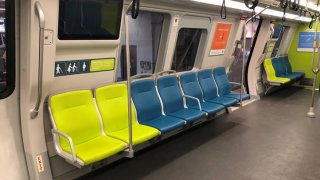
BART is testing more robust air filters and ultraviolet light rods in its train cars in an effort to improve rider safety and reduce the risk of the novel coronavirus spreading, the agency said this week.
The air in BART's train cars is currently replaced around every 70 seconds. The agency is now in the middle of the pilot program to replace the air filters in its cars with filters that are capable of trapping smaller particles.
BART cars currently use filters that trap particles between 3 and 10 microns wide, while the new filters are able to trap particles as small as 0.3 microns. The transit agency is also testing the efficacy of UV-C light rods, which can destroy minute particles in the air.
BART's concern that the rods may jostle around while the train is in motion has not yet proved to be true. "The UV light comes on when it's supposed to," BART vehicle systems engineering manager Ben Holland said. "The safety features that are in place are working well."
Both features are expected to be permanent fixtures in BART's new train cars and are being tested in legacy train cars, which are not under a warranty affecting new cars.
Eventually, the agency hopes to outfit all of its cars with UV-C light rods and finer air filters going forward. "Based on everything we've seen so far, it's looking very promising," Holland said.

